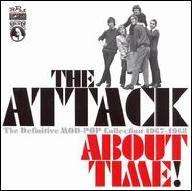The Attack
from London, England
formed
January 1, 1966 - January 1, 1968 (age 2)
Biography
The Attack (thanks to an ever growing legion of collectors dedicated to the vibrant sound of mid- to late-'60s Swinging London) have a far larger fan base now than they ever did during their existence. Indeed their unique brand of guitar-heavy, mod-rock qualifies them as one of the finest examples of (the over used term) freakbeat. Hence over the last 15 years there has been an abundance of vinyl bootlegs and inclusions on such psychedelic/freakbeat compilations as Rubble! The founders Richard Shirman (the only original member to stay with the group throughout all of the lineup changes) and Gerry Henderson were originally in a group called the Soul System, whom, for the best part of a year, had a very unstable lineup. In early 1966, the remnants of the crumbling group were joined by Bob Hodges on organ, David John (not David John of David John the Mood, but Davy O'List under alter ego) on guitar, and Alan Whitehead (on loan from Marmalade) on drums. They soon came to the attention of entrepreneur (gangster?) Don Arden, who then signed them to Decca and changed their name to the Attack. Their debut single released in January 1967 was an extremely anglicized cover of Try It, an American hit for both the Standells and Ohio Express, whose versions were exemplar of the sneering garage sound. However, the Attack's powerful vocals, pop art guitar, and the underbelly of a warm Hammond created a similar atmosphere to the Small Faces (also managed by Don Arden), the Birds, and the Creation. Shortly after the single was released, Davy O'List was handpicked by Andrew Loog Oldham to join the Nice (who were to act as the backup group for newly acquired American Soul singer P.P. Arnold) and quit the group in late February. Meanwhile, Shirman, a regular visitor to the London clubs had been keeping a watchful eye on a young guitarist he had seen jamming with Jimmy Page. Shortly thereafter John Du Cann (mainstay, and songwriter) was introduced into the group. As a follow-up to Try It, a version of Hi-Ho Silver Lining was then released, but Jeff Beck got the hit first in Britain in 1967. The third 45, Created By Clive/Colour of My Mind, backed a foppish sub-Kinks-style number with a fairly groovy mod-psych tune penned by DuCann. Kenny Harold (bass) and Geoff Richardson (guitar) left shortly after the disappointment of Created By Clive, leaving John as the only guitarist. Jim Avery (who later went on to the revolutionary Third World War) was drafted in on bass, with Plug (whom later went on to Welsh acid rock outfit Man) still on drums. After yet even more disappointment surrounding the Magic in the Air single (Decca refused its release on the grounds of it being too heavy), Plug and Jim Avery left the ranks to be replaced by Roger Deane (bass) and Keith Hodge (drums). The final single, released in early 1968, was Neville Thumbcatch, a fruity mod-pop tune with spoken narration, like a lesser counterpart to Cream's Pressed Rat and Warthog. Decca's deal with the Attack expired after that single, with a projected fifth 45, Freedom for You/Feel Like Flying, remaining unreleased. Both sides of that single, as well as seven Attack demos recorded around that time, are included on Angel Air's CD reissue of the rare 1968 album by the Five Day Week Straw People, a studio-only outfit that was led by DuCann. There is also a compilation of the Attack's post-Decca sides entitled Final Dayze, featuring these tracks and more unreleased material (also on Angel Air). Before Decca (who wanted to keep the Attack as a pop act) parted with the group over the continued heavy nature of their newer material, the group had already entered the studio and begun work on the Roman Gods of War album. Both the artwork and a number of songs were completed, but unfortunately the label recorded over the tapes and lost the photos after they dropped the group. DuCann became the dominant creative force in the group prior to their 1968 breakup, and the likes of the unreleased Mr. Pinnodmy's Dilemma and Strange House showed the group developing a heavier rock sound, although still maintaining a sense of British mod-psych whimsy. DuCann would continue to explore a heavier direction with his subsequent group Andromeda, and joined Atomic Rooster in the '70s. ~ Jon "Mojo" Mills, Rovi
Top Tracks
Albums
Videos
Close
















